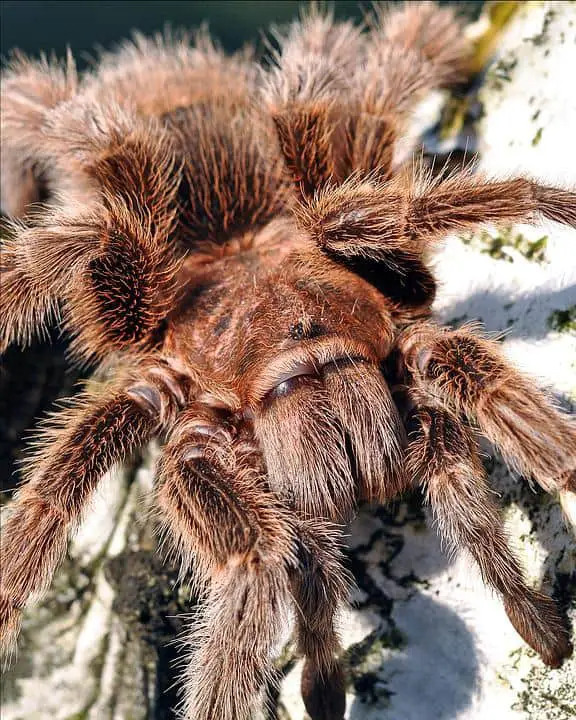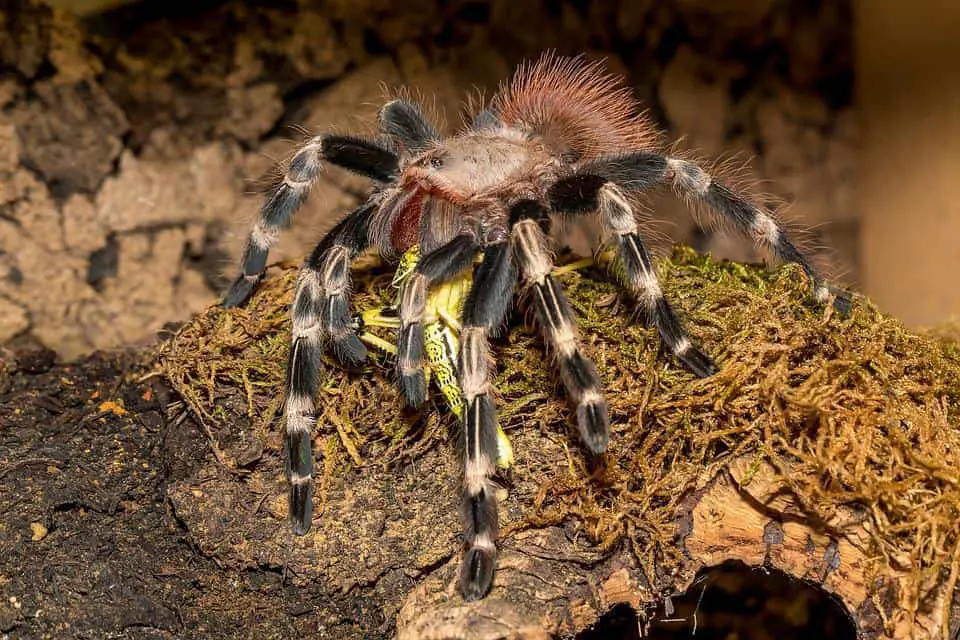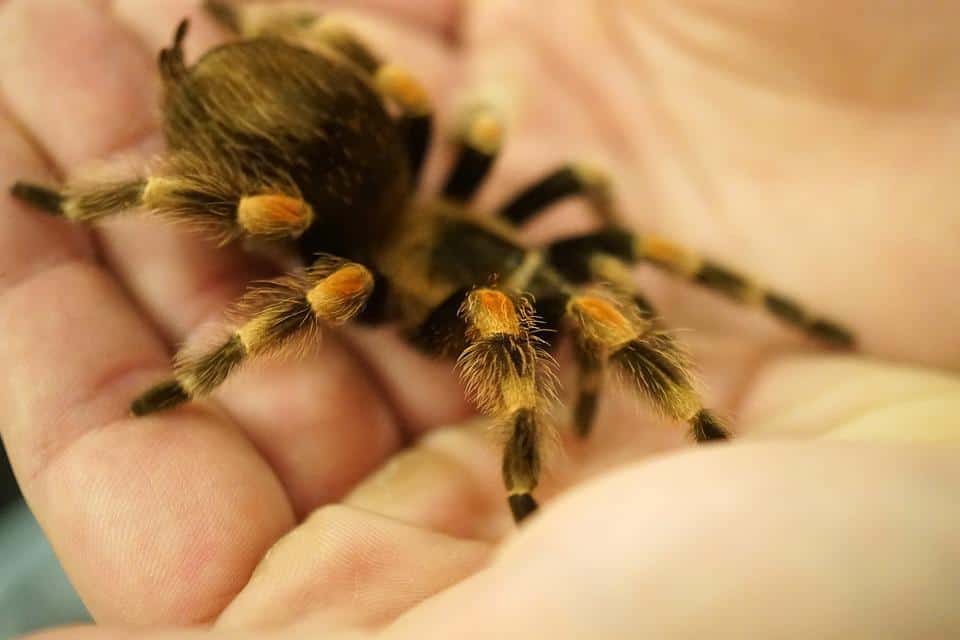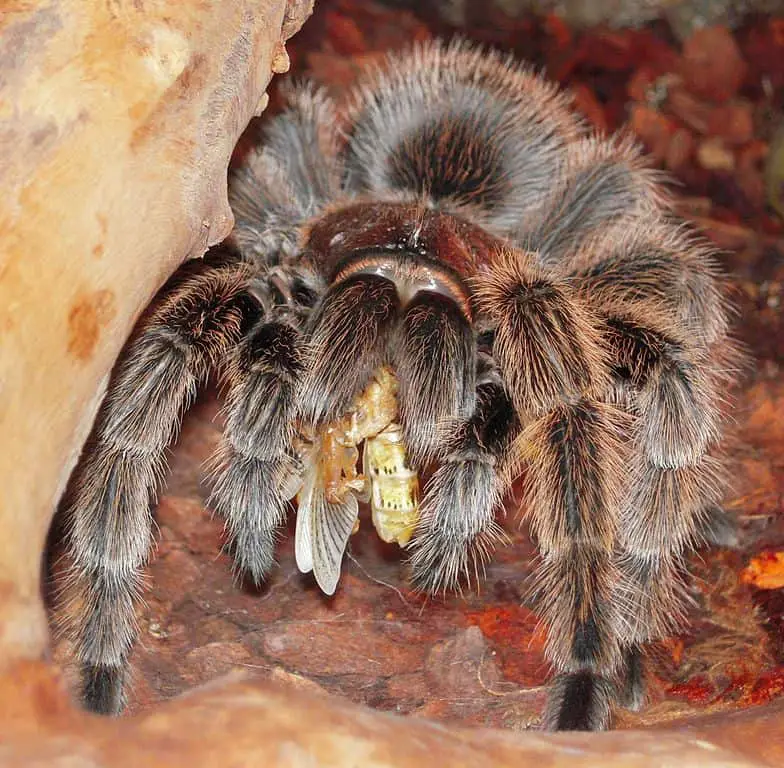Spiders are known to survive for extremely long times on small amounts of food and water. Hence, a tarantula will likely survive for many days even if it is not getting any food or water.
But how long exactly can they go without food or water? This question bugs many tarantula owners when they go for a vacation or have to leave their eight-legged friends alone for longer periods of time.
The answer to that question is that it depends on the species, size, sex, and age of the spider. However, generally speaking, tarantulas can go for several months without eating if they’re healthy and have a full belly.
If you are interested in learning more about this fascinating aspect of these beautiful spiders then keep reading to discover everything you need to know!

How long can tarantulas go without food?

Tarantulas can live for extremely long periods without food. There are over 800 different species identified all over the world. The exact duration of their survival often depends on the species in question. On top of that, age, sex, activity levels, and size also matter here.
Furthermore, it depends on how fat they are. Individuals that have more energy stored in their body are naturally able to go for longer periods without food.
Generally speaking, a healthy, adult tarantula with a full belly is capable of surviving for months without eating anything at all. The reason for this is that these arachnids do not expend a whole lot of energy. They tend to sit in the same place a lot while barely moving, which means that they can survive for extended periods of time without having to eat to replenish energy.
Of course, just because they can go so long without food does not mean that they should. You should by no means stop feeding your spider for such prolonged periods of time. It’s not good for them.
How long can tarantulas go without water?
A tarantula can live for long periods without food, but cannot go for all that long without water. Many people believe that these spiders do not need water all that much because they rarely see them drink. The reason for that is not that they do not need water, but rather that they get a lot of water from the food they eat.
On top of that, tarantulas are nocturnal and often drink during the night when we’re not looking.
As such, they need to have access to fresh and unpolluted drinking water in order to live.
Nevertheless, they’re still capable of going without water for quite a long time. The general consensus is that adult tarantulas can survive for several weeks without drinking, but that this is not good for them. They should always have access to fresh water so that they can drink when they need to.
How long can baby tarantulas survive without food/water?

Baby tarantulas, also known as slings, are still growing and molting frequently. They will not survive as long as adults without food or water.
They will die within a few days if they do not get any food or water. These young tarantulas need extra nutrition to grow and lead a healthy life.
If you have a young tarantula still undergoing molting, make sure it gets enough food at least once in three to four days to survive. It should also have access to fresh water at all times.
Slings are often too small to drink from a water bowl so try dripping the water down the sides of their enclosure instead. They will drink the drops.
My Tarantula isn’t eating/drinking, help!
Many inexperienced hobbyists often panic when their spiders stop eating or drinking completely. Spiders, especially tarantulas, stop eating or drinking in the pre molting stage. During the pre-molting stage, the spider prepares itself to molt and shed its skin to grow a new one.
If you have a young spider that sheds its skin regularly and is not eating or drinking, it may be preparing itself to molt again. Hence, wait patiently to check out what it is doing for a few days or weeks to get a clear idea!
Similarly, after a molt, tarantulas should not be fed. Their fangs need time to harden before they can eat after a molt!
If your tarantula is not molting and not eating as well there might be something else wrong with them. In that case, seek help from an expert.
How does a tarantula survive without any food for so long?
It’s pretty astounding that these spiders can live so long without eating. How do they do it exactly?
The secret to their success is their very slow metabolic rate. Comparatively, tarantulas have a nearly 50% lower metabolic rate than the other species (not spiders) of the same size.
They digest their foods slowly. Hence, they can live with a minimum amount of food for days. They will take only a few meals once in a while to sustain themselves to maintain their nutrient level. On top of that, spiders often lower their activity rate to counter food scarcity, which drops their metabolic rate even further.
It’s not for nothing that these spiders seem to spend so much time in their burrow, they hate wasting energy when they do not need to!
How do tarantulas eat and drink?

Tarantulas are carnivore insects. They are also opportunistic spiders. That means that they will eat whenever they get prey nearby. They do spin webs but use them differently than other spiders. They use their silk lines to create an alert system. This line helps them to realize if the prey is in their vicinity.
Tarantulas usually eat small insects. When it catches prey, it first liquefies it by injecting it with venom through its fangs. After the prey becomes semi-liquid, they use their sucking stomach muscles to suck the liquid mass. It then digests the liquid mass properly to get nutrients.
Larger species often eat the prey after discarding its wings and legs, and some other body parts.
Like any other creature on earth, they need to consume water to hydrate themselves. In general, they get the water from their prey. But, like any spider, they also need to drink water occasionally.
They have a small mouth orifice under their fangs. This orifice holds chelicerae, a special organ or muscle. In the wild, tarantulas consume water from dewdrops or rain droplets. They use the chelicerae to suck water.
Spiders will only drink water when they feel dehydrated or do not have access to food. They will drink enough water to sustain themselves in dire situations. But they consume water very slowly. Hence, they may take their sweet time to drink their fill. If they don’t have enough food, they may also increase their water intake.
They drink water to increase the humidity level inside their body. Drinking water also offers them satisfaction and keeps them fit too.
Can tarantulas starve?
Like all animals, tarantulas can indeed die of starvation. But, the chances of dying due to starvation are very low.
An adult tarantula can survive for nearly two years without any food if they have access to drinking water. Younger specimens that are still molting need to eat frequently. Otherwise, they can die due to starvation. Growing takes a lot of energy, which is why juveniles and slings need to eat much more frequently.
If you have one of these animals as a pet, it is better to give them fresh water regularly. If you are going on a vacation, ensure that they have access to plenty of water and make sure to fill their belly before you leave.
Final words
Tarantulas are remarkable creatures that can go for months without eating if they need to. Of course, in captivity, we do not let them go that long without food, but they’re perfectly adapted to survive food shortages in the wild as long as they have access to water.
They’re capable of this amazing feat due to their incredibly low metabolic rate. These creatures do not move around a whole lot, which means that they do not expend a lot of energy. As a result, they can go for extremely long periods without having to eat!
- How Long Do American Eskimo Dogs Live? Important Factors and Care Tips - September 29, 2023
- Do American Bulldogs Need Grooming? Essential Tips and Care Guidelines - September 29, 2023
- Do Bengal Cats Enjoy Playing? Essential Tips for Keeping Them Active - September 29, 2023